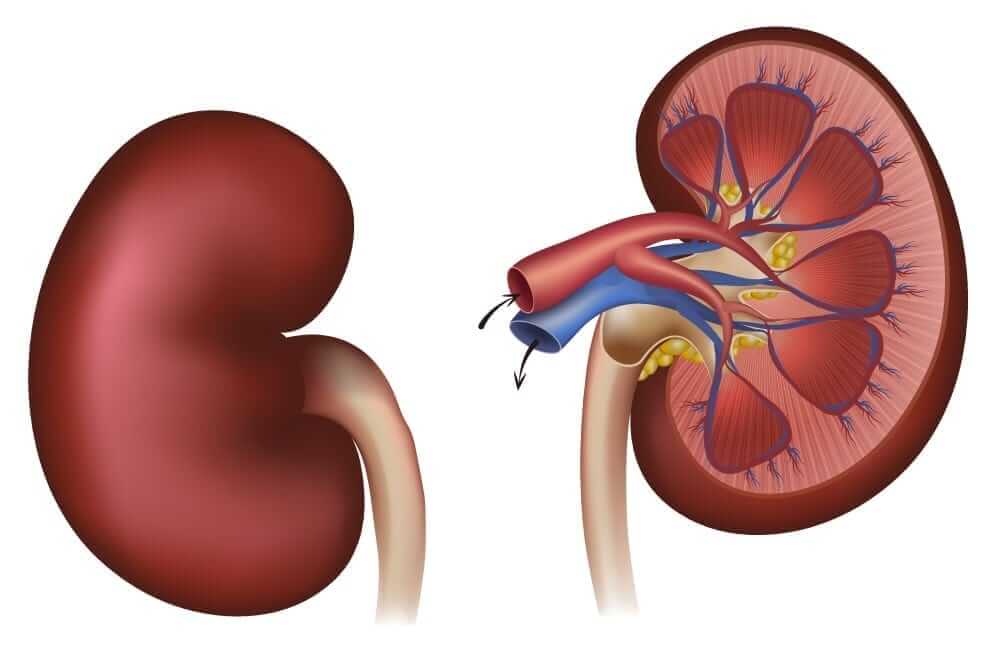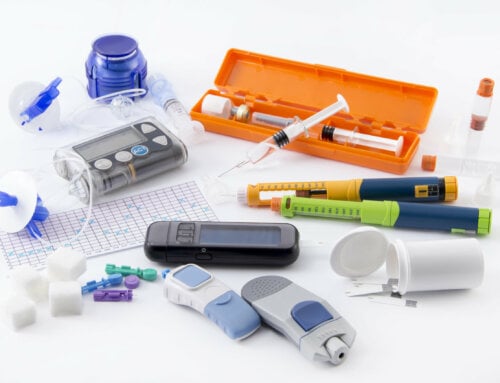One of the leading long term complications of diabetes is chronic kidney disease. In fact diabetes is the number one cause of chronic kidney disease as well as the biggest reason people are placed on dialysis. Diabetes causes injury to the small blood vessels located in the kidneys which results in these future issues. “30% of patients with type 1 diabetes and up to 40% of patients with type 2 diabetes will eventually suffer from kidney failure,” according to the National Kidney Foundation.
What do the Kidneys do?
The kidneys are crucial for maintaining a healthy body. They filter both toxins or waste products and extra fluid from the blood stream. With diabetes, the kidneys must filter excess blood sugar in the nephrons especially when the blood sugars are elevated. When blood sugars are elevated for a long period of time, the nephrons of the kidney and the blood vessels are overworked and become less efficient. With low kidney function, the toxins begin to build up in the body and eventually cause multiple problems.
What are the Possible Symptoms of Kidney Disease?
Not all people with diabetes suffer from kidney disease and those with kidney disease may not display any early symptoms. Others may suffer from a multitude of symptoms. These may include changes in urination frequency especially with an increase during the night time. Some may experience visible or microscopic blood in the urine. Swelling or fluid retention is common since the kidneys can no longer filter the fluid efficiently. The ankles, legs, feet, hands and face generally swell due to poor kidney function.
Many times kidney disease causes “uremia” which is a buildup of excess waste products or toxins in the blood stream. This makes people feel nauseated, causes loss of appetite, may cause weight loss and the need to frequently vomit. Uremia can produce a metallic taste in the mouth or foul breath. With uremia people tend to have vitamin/mineral deficiencies as well as possible malnutrition. Waste build up may cause rashes and skin patches around the body; many patients also develop severe and uncontrollable itching. Kidney disease may present with fatigue, chronic leg or back pain, weakness and the chills. These symptoms are generally caused by anemia or lack of red blood cells related to the formation of EPO, a hormone that decreases as kidney disease becomes evident. Shortness of breath may signal anemia as well. The lack of red blood cells make it difficult to carry oxygen throughout the body; this lack of oxygen may cause dizziness and periods of memory loss.
What Medical Changes Occur and How Do We Know?
Usually the earliest sign of kidney disease is “the excretion of albumin in the urine.” This is a small amount of blood protein leaking into the urine called “micro-albumin.” Micro-albumin can easily be checked with an annual urine analysis. Blood pressure should be monitored at each visit since it can rise with kidney problems. Another test done evaluating kidney function using blood is the GFR- glomerular filtration rate. The GFR is a measure of how well the kidneys are working. Creatinine, which is formed when the muscles work is a waste product that can accumulate over time when the kidneys are failing. The higher the creatinine the more the kidneys are damaged.
The GFR test gives a numerical grade which tells about the functionality of the kidneys; a GFR of less than 60 milliliters per minute indicates the start of kidney disease. As the filtration number drops the level of kidney disease increases and is based on stages. There are 5 stages of kidney failure with stages 3, 4 and 5 considered more severe. When stage 4 presents the GFR is running at a filtration rate of 15-30%. “Established renal failure” is Stage 5 with the lowest rate of filtration of 15% or below. There are limited choices of treatment when stage 5 is reached. When kidneys fail, there is an option of dialysis-an artificial blood cleaning process or having a kidney transplant from a donor. Years ago, kidney transplants were rarely offered to people with diabetes but that has changed and they often do quite well especially when the diabetes and blood pressure are well controlled.
What Can You do to Help Prevent Kidney Disease When You Have Diabetes?
The best recommendations for the prevention of kidney disease as a diabetes complication is to have your A1C at or below 7%. This is accomplished with a proper food plan-reduced portion size, fresh wholesome ingredients and eating on a schedule. Also include a minimum of 30 minutes of aerobic activity 5 days a week and medications taken as prescribed. Checking blood sugar with a glucose meter daily can keep you on track instead of just relying on the 3 month A1C. The other critical step is controlling blood pressure to a level of 140/80 or below. Blood pressure can be reduced with weight loss, exercise, a low sodium diet as well as blood pressure medications. Your health care provider may have to give you 2-4 blood pressure medications to achieve adequate control.
The first line blood pressure medications are called ACE –angiotensin converting enzyme inhibitors such as Lisinopril or an ARB –Losartan; these are offered for kidney protection as well as blood pressure control. They may recommend other drug classes –diuretics, beta blockers or calcium channel blockers in addition for ultimate control. You should visit your nephrologist on a yearly basis to obtain certain urine and blood tests. Meeting with a registered dietitian is suggested especially if you need to lower your protein and potassium intake. Watch out for OTC pain killers and use them sparingly if at all. Medications such as Advil, Aleve and Motrin can effect kidney function and be toxic to them. Stop smoking if you already smoke and do not start.
Kidney disease is not a guaranteed complication with diabetes. You can make simple changes in your daily life to help lower your risks. Stay active and stay informed!







Leave A Comment